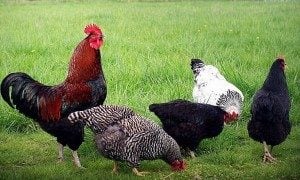Things get really confusing though when an aspiring organic gardener sees a plant fertilizer labeled as organic. Organic means good, right?! Well, not always... So I wanted to sum up a few of my personal reasons behind the bad taste in my mouth over these "organic" products.
First and foremost keep in mind that just like any other product labeling, these popular brand name companies are out to SELL to you .... not to take care of you.
The word "organic" can be used in the traditional, chemistry sense when not involved with the actual food products on the shelves at a grocery store. There is no USDA food regulation for labeling fertilizers as organic.
When you see an "organic" label on a fertilizer product.... it means that it's an organic compound in the truest sense.... not in the sense of it being USDA certified organic and safer for human consumption.
Here's an example. There are some dry, granulated "organic" fertilizers made entirely out of the bedding or litter used in factory farmed chicken housing. So what does that mean? That means these chickens who are processed and pumped full of antibiotics, GMO corn and growth hormones are housed on top a layer of material like wood shavings.
 |
| (image courtesy of CETFA) |
YUM! .... yeah, not at all.
Now don't get me wrong! Chicken manure is a fantastic staple in the organic gardeners bag of tricks, but when that manure comes from factory farms there is NOTHING sustainable, organic, healthy or kind about it.
An alternative? Raise your own chickens (you really only need 2 or 3 for a back yard garden and you get eggs!), find a friend who raises chickens or look up local and humane chicken farms in your area.
 |
| Photo Courtesy of Backyard Chickens.com |
Agreed! I have four hens now producing eggs, but more importantly fresh poop! It costs pennies a day. Check it out!
ReplyDeletehttp://mindyourdirt.com/2015/06/01/backyard-chicken-eggonomics-how-much-does-it-really-cost-to-raise-chickens/